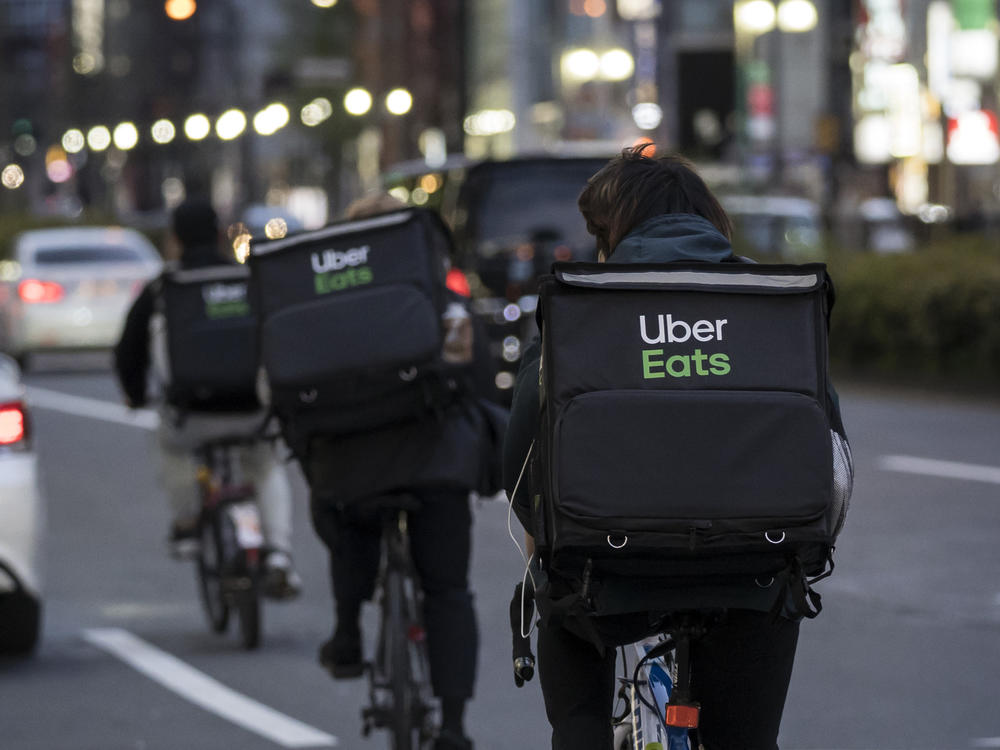Section Branding
Header Content
Uber Gobbles Up Postmates In $2.65 Billion Bet On Food Delivery
Primary Content
Uber is buying the delivery app Postmates, bolstering its food-delivery business at a time when few people are hailing rides.
The $2.65 billion all-stock deal is a sign of how Uber's business model has been turned upside down as customers have stayed home during the coronavirus pandemic.
Demand for rides — by far Uber's biggest business — plunged 75% in the second quarter from a year ago, CEO Dara Khosrowshahi told Wall Street analysts in a conference call on Monday discussing the deal.
In contrast, orders for its Uber Eats food delivery service doubled during the same three-month period.
"Consumers and restaurants have been shifting towards delivery before COVID-19," Khosrowshahi said. "But the pandemic has accelerated these trends, rapidly attracting new customers and restaurants."
While Uber Eats is already the second-largest food delivery service in the US, according to data from Edison Trends, Postmates has a strong hold in major Western markets, including Los Angeles, Phoenix and Las Vegas. Combined, Uber Eats and Postmates will have a 37% market share — narrowing in but still clearly behind the biggest app, DoorDash. It has 45% of the U.S. market.
In a written announcement, Uber noted Postmates had strong relationships with small- and medium-sized restaurants. It said it will keep the Postmates app running even after the purchase is finalized.
Khosrowshahi said Uber is looking to capitalize on surging demand for delivery of all kinds, noting that Postmates has pushed into delivering items such as alcohol, groceries and pharmacy items.
"The vision for us is to become an everyday service," he said.
But the deal will not stop Uber, which continues to report large losses, from bleeding cash. It and rival food-delivery apps spend a lot on discounts to attract customers.
The tough conditions in the food-delivery market have spurred a race for scale. Last month, Grubhub, the U.S.'s third-largest delivery app, was snapped up by Just Eat Takeaway, a European company, for $7.3 billion. Uber had considered buying Grubhub itself. Less than a year ago, DoorDash bought another smaller app, Caviar.
"There's a battle royale going on in food delivery," said Dan Ives, an analyst at Wedbush Securities. That battle, he added, is good news for customers' wallets, as the apps compete to offer lower prices.
But some restaurants say they have been more hurt than helped by the growing popularity of delivery. Apps charge between 20% to 40% in commission per order. To help restaurants, several cities, from New York to Seattle, have set caps on how much the apps can charge to deliver meals.
The impact on Uber drivers is not clear. Many have turned to food delivery during the pandemic to make up for the loss of rides, said Harry Campbell, a driver who runs the popular blog The Rideshare Guy.
"Our top content on the blog and on the YouTube channel is all food delivery," he said. "Everyone is signing up or trying to understand it and the earnings potential."
Uber says the Postmates deal will help drivers by giving them another way to earn money when ride-hailing is slow. The company says drivers also can combine multiple deliveries in a single trip, increasing efficiency and earning more money per trip.
But Campbell cautioned that the delivery boom is not a panacea for drivers whose income has been decimated by the pandemic. Many drivers are already feeling squeezed, he said, because transporting food brings in less money than transporting people.
"When you can go work for Uber Eats or DoorDash or Caviar or Postmates, you can kind of compare the various offers. You can see who's offering the best bonuses ... And you can kind of hold each company accountable," Campbell said.
Consolidation "means there will just be less options for [drivers] and likely earnings will suffer because of that," he added.
Editor's note: Uber is among NPR's financial supporters.
Copyright 2020 NPR. To see more, visit https://www.npr.org.

